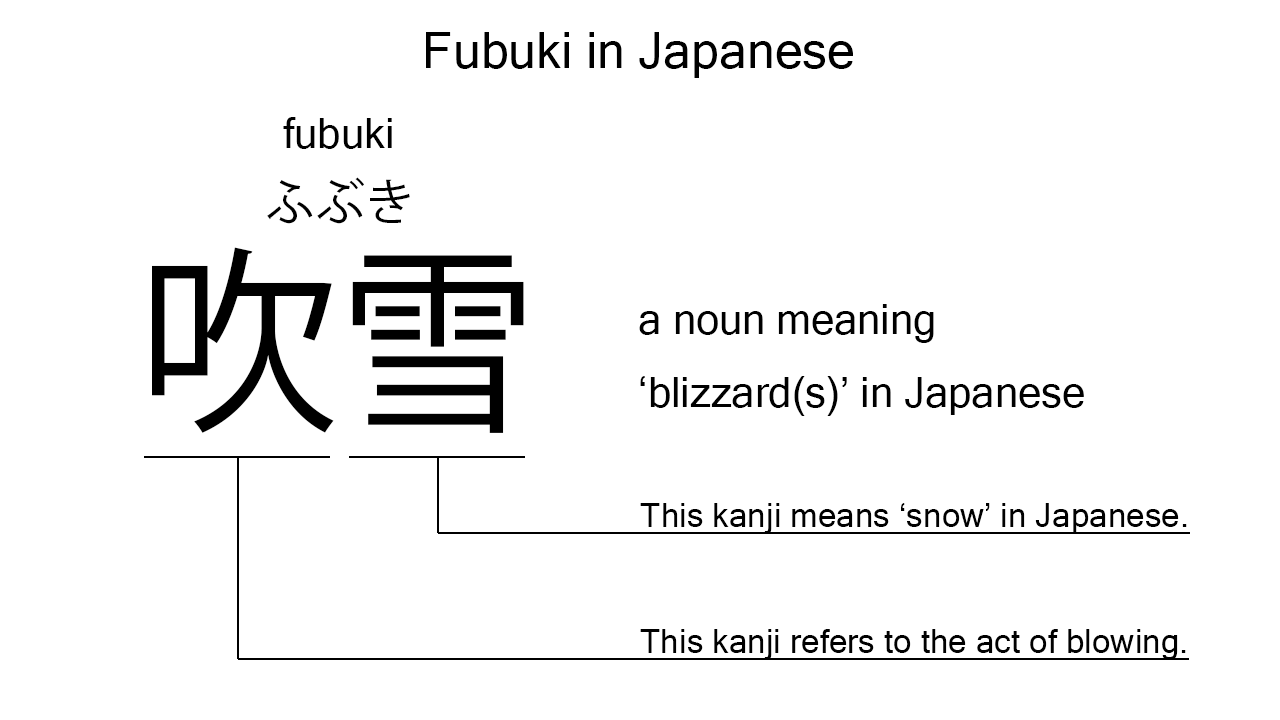What does “fubuki” mean in Japanese?
Native speakers say “fubuki” often to mean ‘blizzard’ in Japanese. Perhaps, some Japanese learners know this word as it is sometimes used in Japanese movies, songs, novels, manga, anime, and the like. In this blog post, however, I will explain this word in detail based on its kanji expression. And also, I will explain how to use it through example sentences. My explanations would help Japanese learners understand “fubuki” more clearly. Then, let’s get started!
Contents
Definition and meanings of “fubuki”
Let me start with the definition and meanings of “fubuki”.
- fubuki – 吹雪 (ふぶき) : a noun meaning ‘blizzard’ or ‘snowstorm’ in Japanese. This can also work as plural. Learn more about Japanese plural.
The definition and meanings are not that difficult, I think. To understand this noun more clearly, however, let me explain its kanji characters in detail, one by one.
What does “fubuki” literally mean in Japanese?
The kanji expression of “fubuki” consists of the following two kanji characters:
- 吹 : a kanji character often used to refer to the act of blowing.
- 雪 : a kanji character widely used to mean ‘snow’ in Japanese.
These two kanji characters tell us that the formed noun literally means ‘blowing snow’ in Japanese. This literal interpretation is not completely in line with the actual meanings, but still understandable, I think. Blizzards and snowstorms are strongly related to blowing snow.

When we meet new kanji expressions, we should check their kanji characters in detail to understand their meanings clearly and deeply. In many cases, kanji characters tell us a lot about the meanings of the expressions they form. Actually, here, we could get the better understanding of “fubuki” through the detailed kanji check above.
So far, I’ve explained the definition and meanings of “fubuki” together with its kanji characters. Then, let me explain how to use it through the example sentences below.
Example #1: how to say “blizzard” in Japanese
kono fubuki wa totemo kibishii – この吹雪はとても厳しい (このふぶきはとてもきびしい)
This blizzard is very severe.
Below are the new words used in the example sentence.
- kono – この : a determiner used before a noun which refers to something close to the speaker. In the example, this is used before “fubuki” to say “this blizzard” in Japanese.
- wa – は : a binding particle working as a case marker or topic marker. In the example, this works after “kono fubuki” to make the subject in the sentence.
- totemo – とても : an adverb of degree meaning ‘very’, ‘much’, ‘so’, or such in Japanese. In the example, this works in front of “kibishii” to emphasize its meaning.
- kibishii – 厳しい (きびしい) : an i-adjective meaning ‘severe’ or such in Japanese.
This is a typical usage of “fubuki”. In this example, it works together with the determiner, “kono”, to mean ‘this blizzard’ in Japanese.
Example #2: another usage of “fubuki”
「fubuki wa kowai」to imouto ga it ta – 「吹雪は怖い」と妹が言った (「ふぶきはこわい」といもうとがいった)
“Blizzards are scary,” my little sister said.
Below are the new words used in the example sentence.
- kowai – 怖い (こわい) : an i-adjective meaning ‘scary’ in Japanese.
- to – と : a case particle working as a quote marker. In the example, this works after the clause to indicate what “imouto” said.
- imouto – 妹 (いもうと) : a noun meaning ‘little sister’ in Japanese. This can also work as plural.
- ga – が : a case particle used to make the subject word or the object word in a sentence. In the example, this is used after “imouto” to make the subject in the sentence.
- it – 言っ (いっ) : one conjugation of the verb, “iu“, which means ‘to say’ in Japanese. In the example, it has been conjugated for the better connection with its following word.
- ta – た : an auxiliary verb used after a verb, adjective, or auxiliary verb to make its past tense form. Probably, this is well known as a part of Japanese ta form. In the example, this is used after “it” to make its past tense form, “it ta”.
This is another typical usage of “fubuki”. In this example, it works together with the binding particle, “wa”, to become the subject in the clause. Anyway, when we want to mean a ‘blizzard’ or ‘snowstorm’ in Japanese, this noun is always a very good option.
Summary
In this blog post, I’ve explained the definition and meanings of “fubuki” in detail based on its kanji expression. And also, I’ve explained how to use it through the example sentences. Let me summarize them as follows.
- fubuki – 吹雪 (ふぶき) : a noun meaning ‘blizzard’ or ‘snowstorm’ in Japanese. This can also work as plural. These two kanji characters literally mean ‘blowing snow’ in Japanese. This literal interpretation is not completely in line with the actual meanings, but still understandable, I think. Blizzards and snowstorms are strongly related to blowing snow.
Hope my explanations are understandable and helpful for Japanese learners.
Leave a Reply